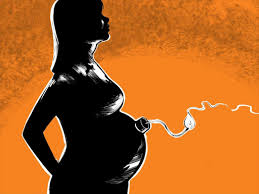

When FW was delivering her firstborn daughter in 2015, she walked into a city hospital with a well-padded insurance card, ready for childbirth.
But the moment the front office saw the extent of her cover, she overheard one of the attendants telling a nurse that she was a caesarean section candidate.
Overwhelmed by the physical toll of pregnancy and the faint pain of early labour, FW did not question how such a decision could be made even before a doctor examined her.
She was admitted immediately and wheeled to theatre. Although her baby was safely delivered through C-section, she remained in the hospital for four days—left with lingering questions about whether the procedure was truly necessary.
A report by KELIN titled 'Litigating Obstetric Violence to Enhance Access to Effective Maternal Healthcare Services in Kenya', shows FW’s experience is not isolated. The report finds that many private hospitals in Nairobi and other urban areas are pushing women into expensive procedures such as caesarean sections and sterilisation—often without medical justification and in violation of the women’s rights to informed consent.
The motivation, the report alleges, is largely financial. With commercial targets to meet, some private health institutions appear to prioritise profit over proper medical ethics. Procedures like C-section bring in more revenue, making them more likely to be recommended—regardless of medical necessity.
Women with HIV are especially vulnerable. The report notes that some are forcibly sterilised during caesarean sections, without their consent, under the misguided notion of preventing mother-to-child transmission of HIV. These actions violate reproductive rights and bodily autonomy, the report stresses.
Other documented cases of obstetric violence include pinching, slapping, shoving, being left unattended for hours and verbal abuse during labour.
Patients report being denied anaesthesia or pain relievers during labour and surgery.
“Women are left unattended for long periods while in labour. They are also denied anaesthesia or pain relief during labour and even during caesarean section due to resource constraints in some cases, but this may also stem from attitudes that pain is a normal or deserved part of childbirth,” the report notes.
“This neglect often leads to physical and emotional distress and can result in severe complications for both mother and baby, including obstetric fistula and even death.”
The KELIN report classifies coerced caesarean sections, forced sterilisation, administering drugs or performing surgical procedures without proper explanation or informed consent as significant violations of patient autonomy—practices that are reportedly common in public and private healthcare facilities.
More gravely, the report says obstetric violence sometimes crosses into sexual violence. It cites instances of women and girls being raped or defiled in health facilities—either while accessing toilets and bathrooms or while being attended to by healthcare providers.
Obstetric violence is thus not just a medical or ethical issue—it is a form of gender-based violence. Defined as acts that inflict physical, mental, or sexual harm, including coercion and deprivations of liberty, such abuses during childbirth reflect a broader pattern of disrespect, discrimination and violence against women—across all social classes.
Instant Analysis
The KELIN report exposes a disturbing pattern where profit motives, systemic neglect, and deep-rooted gender biases converge to endanger maternal healthcare in Kenya. What’s most alarming is how normalised these violations have become—turning childbirth, a moment of life, into one of fear, trauma and abuse. Without legal and institutional accountability, the cycle of obstetric violence will persist, undermining public trust in health systems and the fundamental rights of women.

















